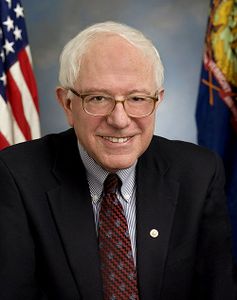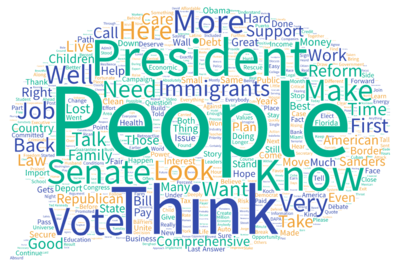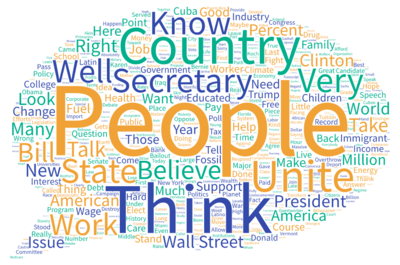Topics and participation in the Univision Democratic debate (March 2016)
![]() Ballotpedia's scope changes periodically, and this article type is no longer actively created or maintained. If you would like to help our coverage grow, consider donating to Ballotpedia.
Ballotpedia's scope changes periodically, and this article type is no longer actively created or maintained. If you would like to help our coverage grow, consider donating to Ballotpedia.
![]() Ballotpedia's scope changes periodically, and this article type is no longer actively created or maintained. If you would like to help our coverage grow, consider donating to Ballotpedia.
Ballotpedia's scope changes periodically, and this article type is no longer actively created or maintained. If you would like to help our coverage grow, consider donating to Ballotpedia.
Date: November 8, 2016 |
Winner: Donald Trump (R) Hillary Clinton (D) • Jill Stein (G) • Gary Johnson (L) • Vice presidential candidates |
Important dates • Nominating process • Ballotpedia's 2016 Battleground Poll • Polls • Debates • Presidential election by state • Ratings and scorecards |
2028 • 2024 • 2020 • 2016 Have you subscribed yet?
Join the hundreds of thousands of readers trusting Ballotpedia to keep them up to date with the latest political news. Sign up for the Daily Brew.
|
This article analyzes the central themes of the eighth Democratic presidential debate held on March 9, 2016, in Miami, Florida. The transcript prepared by The Washington Post was used to measure candidate participation and audience engagement.[1] Footage from the debate was consulted where there were ambiguities in the text.
To compare the statistics of this debate to those of the previous Democratic debate, see the analysis of the CNN debate held on March 6, 2016.
Segments
Including opening and closing statements, this debate featured 20 unique discussion segments covering immigration reform, the economy and other domestic issues. These discussion segments were measured by any shift in the theme of a discussion prompted by one of the moderators: Maria Elena Salinas, Jorge Ramos and Karen Tumulty.
- Opening statements
- Michigan primary results
- Hillary Clinton's private email server
- Donald Trump and racism
- Immigration reform
- Deportation of children and individuals without criminal records
- Border security
- Immigration enforcement and the separation of families
- Clinton's trustworthiness
- Clinton's Wall Street speeches
- Clinton's response to the 2012 Benghazi attack
- Bernie Sanders and establishment politics
- Living conditions of Latinos
- Debt-free higher education
- Climate change and bipartisan environmental legislation
- Relationship between Wall Street and Washington
- U.S.-Cuba relations
- Puerto Rican debt crisis
- Supreme Court vacancy
- Closing statements
Approximately one-third of the discussion segments related to immigration reform and issues facing Latinos in the United States and abroad. Another third covered issues relating to the individual political careers and campaigns of Clinton, Sanders, and Trump.
Participants
Overall participation
Participation in a discussion segment was defined as a substantive comment related to the discussion segment's topic. Jokes and attempts to gain permission from a moderator to speak were not considered participatory speech acts. In some instances, candidates who participated in a discussion segment diverted from the prompted topic.
Clinton and Sanders participated in almost every discussion segment.
Candidate participation by speaking order
This study also calculated the number of times a candidate spoke first, second, third, or fourth during a discussion segment, whether prompted by a moderator with a question or invitation to rebut or by interjection.
Clinton was called on to speak first three times as often as Sanders.
Audience engagement
Audience engagement was measured by noting applause, cheering, or laughter in The Washington Post's transcript. Footage from the debate was consulted when the text was ambiguous about to whom the audience was responding.
With 59 positive responses from the live audience, Sanders again registered more audience engagement than Clinton.
The discussion segments on debt-free higher education, Clinton's Wall Street speeches and the deportation of children and individuals without criminal records received the most audience engagement overall.
Candidate analysis
|
|
See also
- Presidential candidates, 2016
- Presidential election, 2016/Polls
- 2016 presidential candidate ratings and scorecards
- Presidential election, 2016/Straw polls
Footnotes










